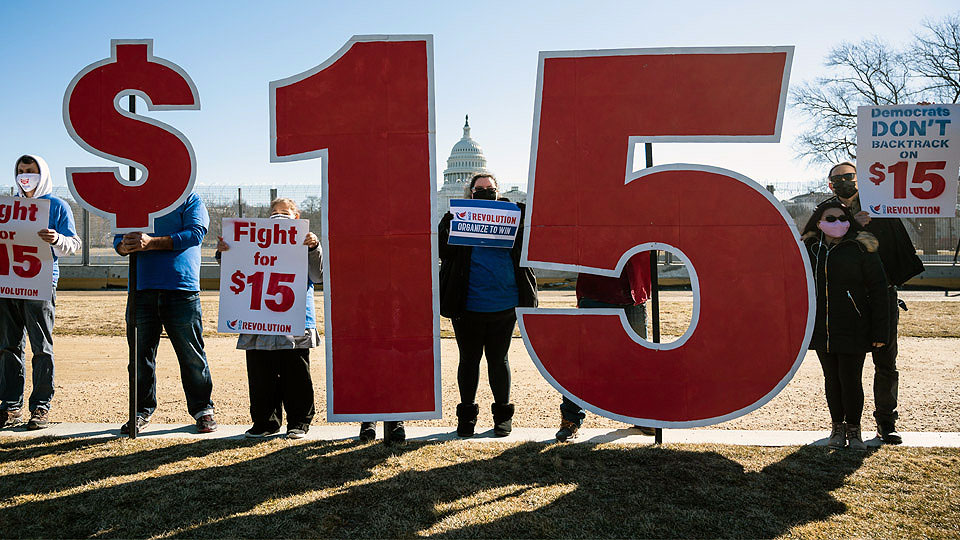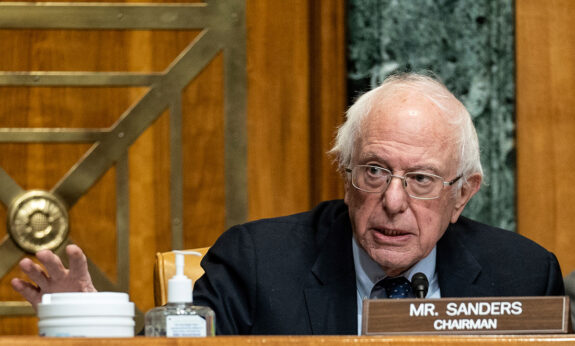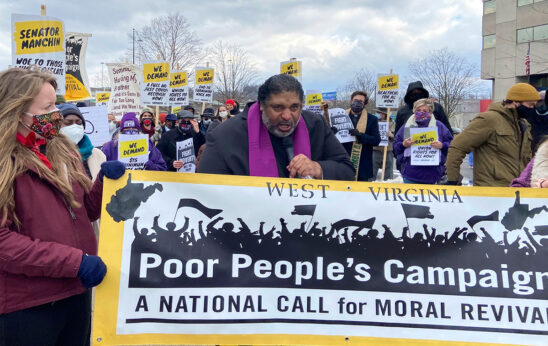
WASHINGTON (PAI)—Congressional supporters of a $15 minimum wage are not backing down, despite a ruling by the Senate parliamentarian Thursday night that the hike cannot be part of a reconciliation package in the upper chamber. The reconciliation procedure—which lets tax and budget legislation proceed with a simple majority—would have allowed the wage hike to pass as part of the Biden administration’s American Rescue Plan; the parliamentarian’s call nixes that possibility.
Despite the decision, Speaker Nancy Pelosi refused to strip the pay increase in the version of the American Rescue Plan being voted on by the House Friday.

And in an attempt to do an end-run around the parliamentarian’s technicality, Sen. Bernie Sanders, who chairs the Senate Budget Committee, said he plans to put forward an amendment which would remove tax deductions for big corporations that do not pay their workers $15 an hour and incentivize smaller businesses to do so as well. While it would not directly alter U.S. minimum wage law, Sanders’s move would make $15 the effective wage in many sectors.
“One of the scandals in the current economy is that there are millions of workers working for starvation wages,” he said before a Thursday hearing on raising the wage, focusing on low wages paid by Walmart and McDonalds. The CEOs of those firms were invited to testify but refused. Meanwhile, the GOP is using the rules to shield their real motive—flat-out opposition to any aid at all.
Sanders is already garnering support for his proposal. “Count me in,” Democratic Sen. Brian Schatz of Hawaii said upon news of the Sanders plan. Finance Committee chair Sen. Ron Wyden also signaled he would explore the option as a means of still getting a wage boost into the bill for millions of workers. There is speculation that the amendment route may even be able to garner the support of Democratic Sens. Joe Manchin and Kyrsten Sinema, who had expressed their opposition to altering minimum wage law.
The entire affair is elevating, again, calls to eliminate the filibuster—an arcane Senate rule that requires 60 votes to advance legislation in the chamber. It has been infamously used in the past to block or delay civil rights and other progressive legislation. Sen. Chris Murphy of Connecticut said Thursday night that the filibuster “is killing democracy.”
Rep. Ilhan Omar, DFL-Minn., meanwhile, called for the Senate parliamentarian to be fired. “Abolish the filibuster. Replace the parliamentarian,” Omar said in a tweet Thursday. “What’s a Democratic majority if we can’t pass our priority bills? This is unacceptable.” There is precedent for such action. In 2001, Republicans fired a Senate parliamentarian who stood in the way of tax cuts for the rich. Some conservative Democrats are expressing opposition to a firing, though, so it is unlikely to happen in the short term.
It’s not yet clear whether the Sanders amendment will be included when the bill arrives in the Senate, leaving the final fate of the $15 minimum wage unclear as of now. But with all the attention around Biden’s $1.9 trillion economic recovery plan focused on the $15, it’s easy to forget the legislation has a lot more in it than that, including a lot more for workers.
What else is in the American Rescue Plan
From money to safely reopen schools to increasing dollars to battle the coronavirus pandemic—the plague that’s killed 506,000 people and forced continuing rescues in the first place—to subsidizing COBRA health benefits to the jobless to an extended ban on evictions for non-payment of rent or foreclosure of mortgages, the measure would help tens of millions of people beyond just their immediate salary amounts. And don’t forget the $1,400-per-adult relief checks, to add onto the $600 that was supposed to arrive in Americans’ mailboxes, or bank accounts, from December’s aid bill.
Or the extension of federal unemployment aid, including aid to “gig economy” workers, “independent contractors” and musicians, actors, and others not covered by regular state-run jobless aid programs. The federal checks would rise by $100 a week, to $400, and run through Aug. 29. Current $300 checks are scheduled to stop on March 14. Performing arts unions lobbied hard, and successfully, for those checks.
Most people who would get the help are those who need it most. A new Economic Policy Institute study of employment last year put into numbers what everybody can see with their own eyes: When the bottom dropped out of the economy a year ago, the bottom dropped out most for people on the bottom.
More than one-quarter (27.1%) of the lowest-wage workers, those in the bottom quarter of income standings—some 7.885 million—lost their jobs to the pandemic and its economic impact, EPI reported. Before that, they made $14 an hour, or less. One-sixth, or 3.27 million people, in the second-lowest income group lost their jobs, too. But the story was different for the top half of the income scale. The middle-income group—the third-lowest—added 586,658 workers. The richest fourth added almost a million workers (980,955).
When people will get the help Biden wants to channel them is up to the outcomes Congress. The Senate faces that March 14 deadline, giving minimum wage backers, and everyone else, precious little time to lobby for their causes. And there are quite a few causes workers should lobby for:
- Aid to states and cities. This $368 billion really is aid to workers, and to prevent more layoffs on top of the 1.4 million that have already occurred, supporters state. “The public health crisis and the economic downturn caused by the pandemic have put state and local governments in an impossible bind: Demand for vital public services increased while revenue plummeted,” AFL-CIO Legislative Director Bill Samuel wrote lawmakers.
“Because states must balance their operating budgets, they have been forced to cut spending and jobs at the same time that demands on the public health system, social services, and education have been increasing to keep up with the pandemic.”
More than 750 state and local officials of both parties chimed in, too.

“Working people have been on the frontlines of this pandemic for nearly a year…Teachers and education workers are doing their best to provide quality education and keep their students safe, janitors are still keeping parks and public buildings clean, healthcare providers are continuing to care for the sick. Meanwhile, it has been ten months since Congress passed the Cares Act to support these frontline workers and the essential services they provide,” they wrote.
“Without significant economic assistance from the federal government, many of these currently middle-class working families are at risk of falling into poverty through no fault of their own. It is a painful irony that while many rightly called these essential workers heroes, our country failed to truly respect them with a promise to protect them and pay them throughout the crisis.”
That letter’s signers included Wisconsin Gov. Tony Evers, eight lieutenant governors, new Illinois House Speaker Chris Welch and dozens of other Illinois lawmakers, Chicago Mayor Lori Lightfoot and 13 city council members, both Twin Cities mayors, Minnesota House Speaker Melissa Hortman, St. Louis City Treasurer Tish Jones, the mayors of Pittsburgh, Denver, Seattle, and Kansas City, Mo., the entire Los Angeles school board and three L.A. County Commissioners, led by Chair Kevin de Leon, a former California state senate president.
The state and local aid also draw GOP flak, as it did in December. Already, Sen. Pat Toomey, R-Pa., has criticized it as a “big city” bailout, code words for criticizing aid to people of color. He’s not the only one.
- COBRA aid. This a particular cause for Unite Here, which saw more than 90% of its members, especially in hotels, restaurants, and related industries, laid off when those establishments closed after the pandemic hit. Many haven’t gotten their jobs back. Losing their jobs cost them company-paid health insurance, too, as it did for other laid-off workers.
COBRA is supposed to replace that, but laid-off workers must pay for it out of pocket. Many can’t. Biden’s bill would subsidize those payments for three months.
Biden’s measure “includes 100% funded coverage for COBRA. Our members are living on a few hundred dollars per week unemployment. Anything less than 100% would sink thousands of laid-off hospitality workers. We need this NOW,” Unite Here tweeted.
- More money to keep planes flying, and airline workers on the job. The Association of Flight Attendants-CWA got those billions of dollars into the Cares Act, but only through the end of August 2020. Mass layoffs ensued. The December aid bill resuscitated that Payroll Support Program, but it too ends in March. AFA-CWA President Sara Nelson, urging her members to call and e-mail lawmakers, wants it to run through Sept. 30. “It is the ONLY jobs and #WorkersFirst program,” she said on the union’s website.
“We need a longer runway for vaccine distribution, and job protections in the meantime, to allow recovery to lift off. Mass layoffs will devastate workers, and they will add hundreds of thousands to overwhelmed state unemployment systems.”
- Rental aid, utility payment aid, and anti-eviction assistance totaling $19.05 billion. The Working Families Party applauds that but is circulating a petition calling for such aid to continue until the pandemic ends.
“Many renters, homeowners, and unemployed workers are teetering on the edge of being evicted, foreclosed out of their homes, or accruing more debt in the middle of an economic crisis—and many are still waiting on unemployment assistance. Nearly 12 million renters were expected to owe an average of almost $6,000 in late rent and utility payments per household as of last month,” its statement explains.
- $130 billion to K-12 public schools to help construct and impose anti-coronavirus measures, such as daily temperature checks, physical distancing in classrooms, sanitizers everywhere, deep cleaning and disinfecting measures, and personal protective equipment.
“Since the beginning of the pandemic, more K-12 jobs have been lost than nearly all of the local education jobs lost during the entire Great Recession,” Rep. Jahana Hayes, D-Conn., a National Education Association member and former National Teacher of the Year, said earlier. Hayes and new Rep. Jamal Bowman, D-N.Y., a School Administrators member and former New York City middle school principal, argued again for the aid at a Feb. 25 zoomed press conference.
“Without sufficient funding from the federal government to support states and school districts during the recovery, experts estimate 1.4 million to 1.9 million education jobs will be lost over the next one to two years,” Hayes said before.
This article, provided by PAI, has been supplemented with late-breaking material by People’s World.













Comments